The Poetry Basket: Magic that is Older Than the Hills
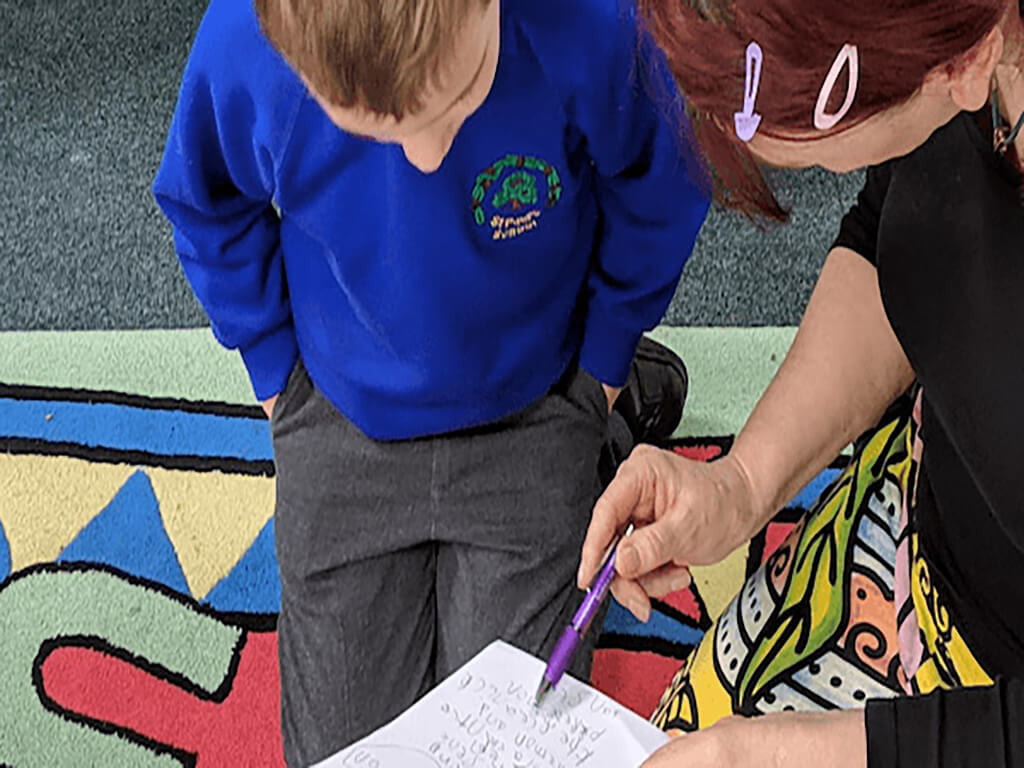
One of the questions I am asked the most about Helicopter Stories is how can we enhance children’s language acquisition if we are scribing their words verbatim?
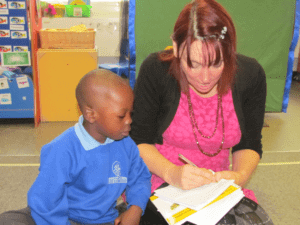
I have always believed that if children grow up in a language rich environment and regularly engage in conversations that are meaningful to them, then their language will grow. But for many of the children I work with, their environment might not always be that rich, or they are coping with learning a second or a third language, or they just haven’t heard that many stories. So where do these children acquire their new words?
What I love about Helicopter Stories is that children get to listen and act in each others stories. In this way they share their experiences, their cultural references, the vividness of their imagination with their peers. When Helicopter Stories is used over a long period of time children create their own language rich environment. They share each others experiences, their ways of acting out different characters, and their philosophies on how they see the world, and they do this in an almost effortless way.
I once worked with a 5 year old boy, who was obviously read to a lot. Whenever he told his Helicopter Story he started it by saying: Once there was a magic star, and when I touched it, it went all shimmery and I fell into another world. Aaron’s stories instantly captured the imagination of the rest of his class. Regardless of whether they were read to regularly, or if they struggled with speech and language issues, the children around Aaron started to invent their own worlds that you reached by touching a magical star. In this way, as is the way of all good storytelling, the children borrowed imagery and language patterns from Aaron and then they made these their own.
But the more I researched the decline in the number of children regularly hearing stories and rhymes, and thought about the rise in speech and language issues that I see all the time within the early years, the more I wondered if this cross-pollination of language was enough.
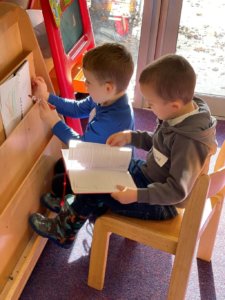
The fact is, children aren’t hearing as many stories or rhymes as they used to. The Bring Back the Bedtime Story campaign found that in many of our classes, less than a third of children have stories read to them and over 50% go to bed with the TV on. And as for rhymes, years ago it was second nature for parents to sing and chant with their babies, but according to recent research, many children are not hearing these rhymes as often as they used to (and when they do, the number they hear is greatly reduced). As a result children are not benefiting from a rich oral culture in the same way as they used to. Then I discovered poetry. Instantly I was hooked. I felt like I had found an answer to the question about language development that was still puzzling me. It wasn’t an amazing rocket science answer, or a fancy pants bells and whistles answer, but it was an answer that connected to something deeply satisfying inside me. I knew that it lay in a place of good practice and linked with my belief in the power of oral storytelling, and I couldn’t wait to share it with my children.
From October 2018, I began introducing more and more poems to the children I worked with in Preschool, Reception and Year 1. What happened next was a piece of magic. The children couldn’t get enough of the poems. They pushed me to learn more and more of them, always wanting to hear the latest one. It was hard to keep up with their appetite.
The children have learnt the poems and without exception know every word. They will individually stand at the front and lead one of them for the class to follow. They have even taught them to their families and the class next door. As soon as I make the initial hand action for each poem they are off and reciting them so enthusiastically!
Rachel – FS2 Teacher (Chippenham)
As the children’s enjoyment of the poems grew, the idea for The Poetry Basket was born. The intention was simple, I wanted to share what I’d learned. The Poetry Basket contains thirty-six videos of poems with actions. It is a resource for practitioners, so they can learn the poems and share them orally with their children. Each poem is 4 to 8 lines long and chosen specifically for children aged 3 to 6. Creating an online programme was new for me, scarily new, but somehow it felt important.
But How Does This Link with Helicopter Stories?
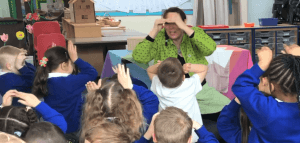
Like Helicopter Stories, rhythm and rhyme plays a hugely important role in the development of early literacy skills. Listening and speaking are the bedrock of reading and writing. They help to develop much stronger literacy ability in later life.
Kate Prentice, a PHD student at Cambridge University explains the science behind this, during a fantastic Radio 4 documentary, Inside the Brain of a Five Year Old.
We think of sound as a continuous stream of noise. Rhythm helps us work our where the words are and then within that where the syllables are, and within that where the intra syllabic units are.
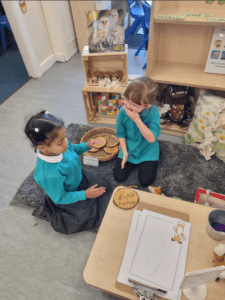
So rhythm helps us to break down language into smaller units and having an intuitive understanding of rhythm, helps children to do do this when they start learning to read and begin decoding the written symbols of words.
The benefits of the spoken word and the impact this has on our engagement with the written word is something I constantly witness during Helicopter Stories.
Recently, a Year 1 teacher I am working with in Chippenham, shared with me an observation that I had not been aware of previously.
The teacher told me that because her children have had Helicopter Stories weekly since they started in Reception, she has noticed a marked improvement in their ability to construct sentences in their writing. During the Storytelling part of Helicopter Stories children dictate a phrase or a sentence at a time, which is then repeated back to them by the adult scribe. The teacher noticed that her children had a much better understanding of where a comma or a full stop should go, than any children of this age group she had worked with previously. It was as if the understanding was inherent for them, from having spoken so many stories.

If we want children to read or write we have to make reading and writing irresistible, purposeful, relevant. We don’t do this by forcing children into it, we do it by encouraging a love of story, poetry and rhyme. Already from feedback on The Poetry Basket, a practitioner in a nursery school told me that after sharing one of the poems about pumpkins with her 3 and 4 year olds, one of them was inspired to make up a pumpkin poem of his own.
My first passion will always be Helicopter Stories. But over the past year I have found a new joy. When I hear the children I work with learning the poems I share with them, before we act out our Helicopter Stories, and I witness the play this leads onto, the developing language that comes out of this, and the children’s ability to invent, I feel lucky to have stumbled on another piece of magic. But like all good pieces of magic, this magic is older than the hills and it has been there for all of time.
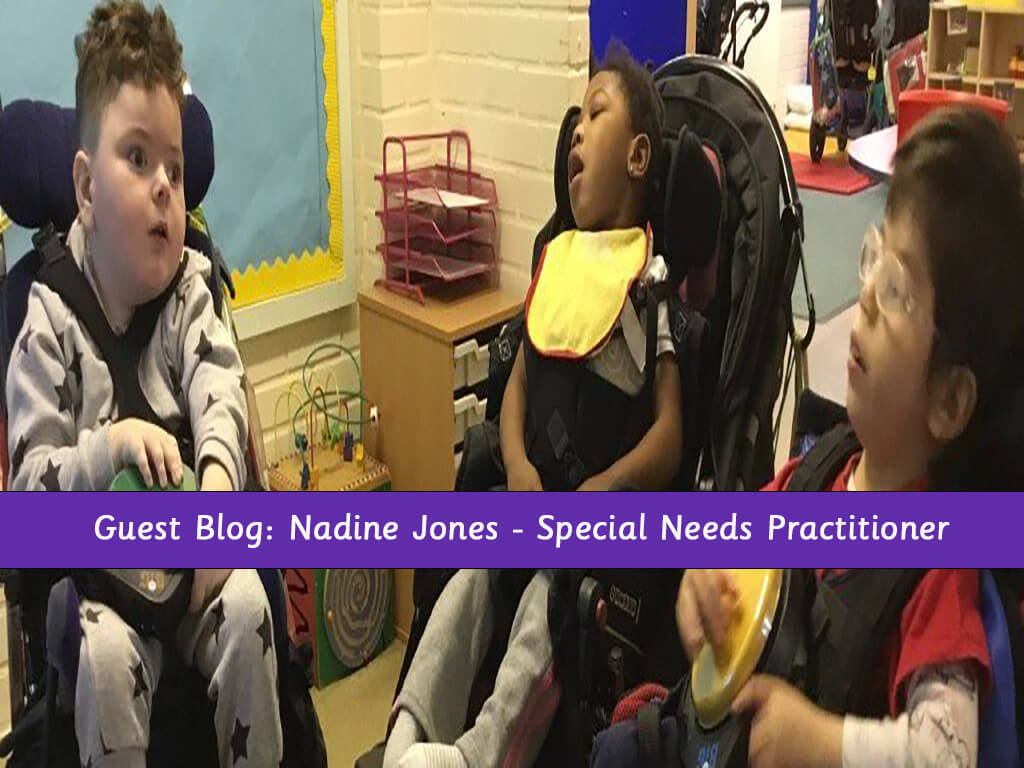
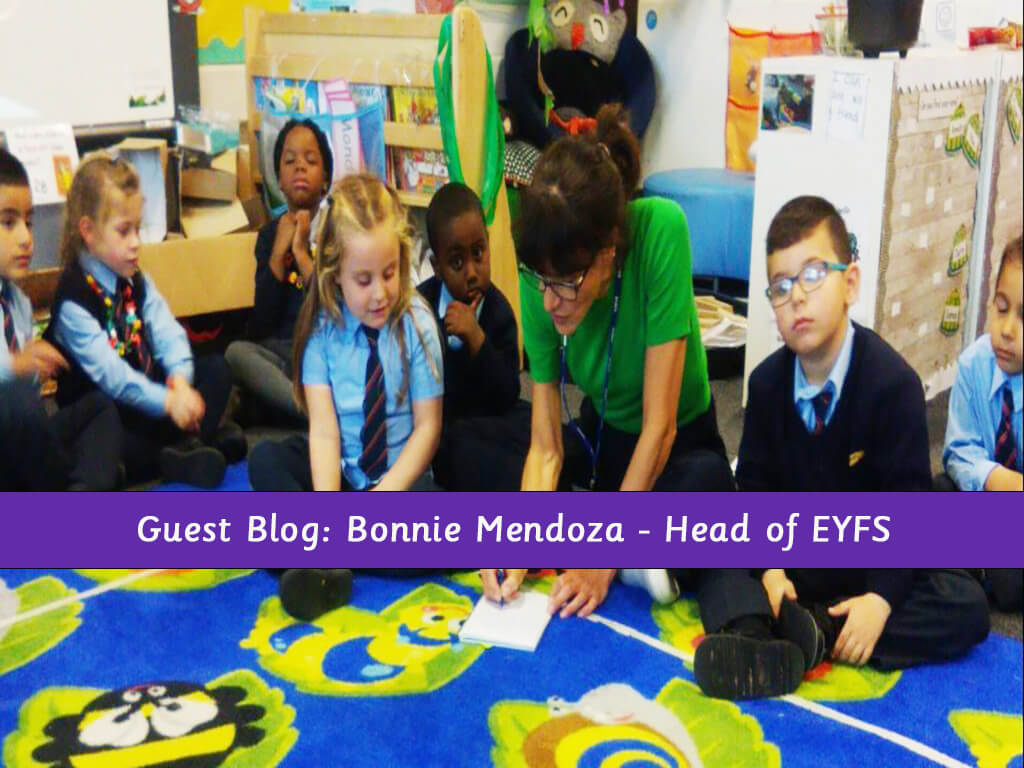
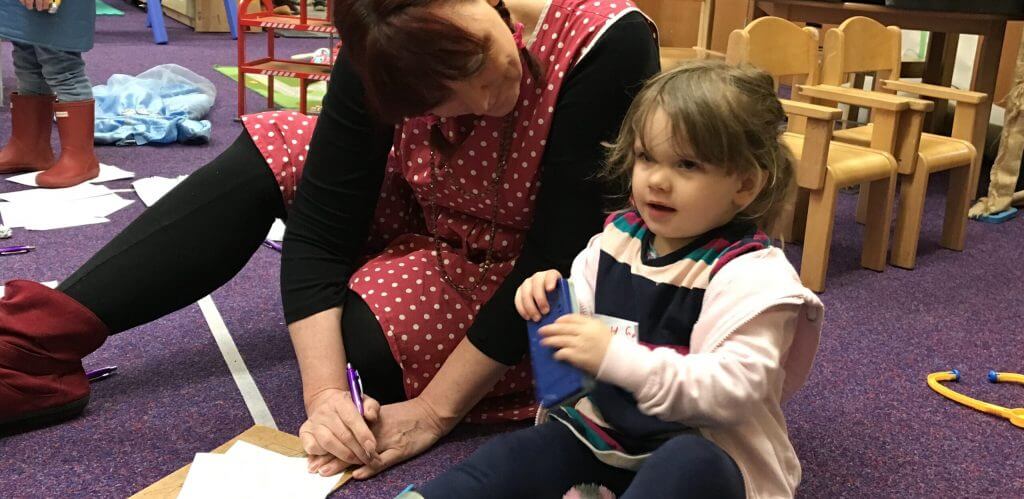
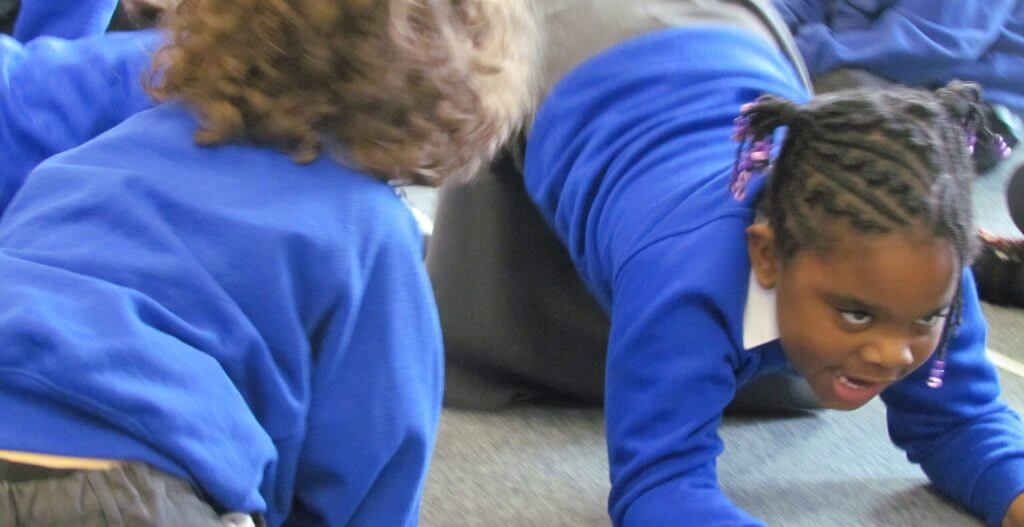
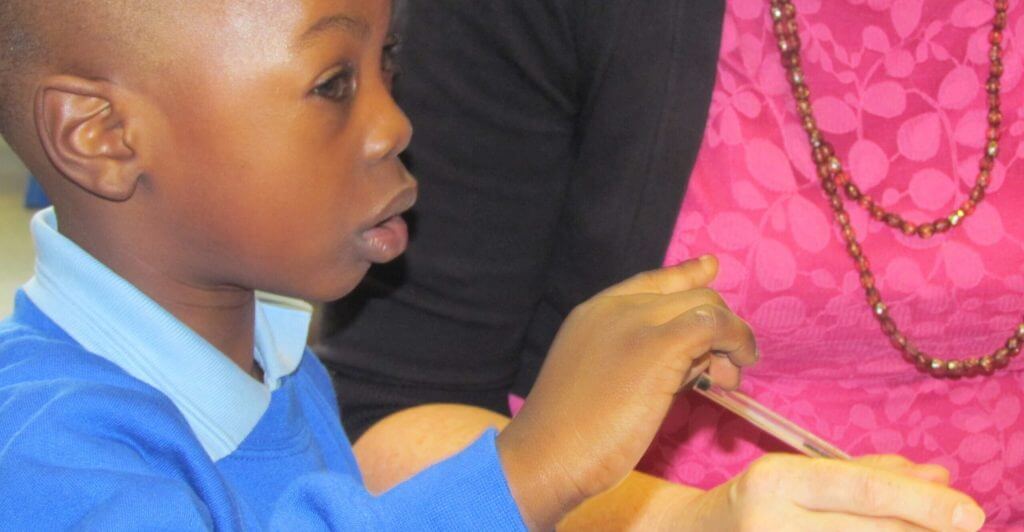
What I love the BEST is that we use the children’s language. Children often have the most innovative ways to express things we reduce to common prose. One of my favorite activities was to walk around the room writing down snippets that I heard from the children. I would write them on cards, and then we would collectively arrange the cards into a poem. The results were stunning!!
I couldn’t agree more. I love the idea of creating poems from snippets of conversation in the classroom, I can really see how that would work. I’d love to read some of them if you still haven any. Thank you for getting in touch.
I am so grateful that you have ‘stumbled upon’ and shared this magic with us all Trish. I believe that story and poetry offers us a wonderful antidote to indifference in our communities, and has the power to re connect people with the shared aim of offering rich language environments within which to raise and nurture our children. We are (at the beginning ) of promoting The Poetry Basket across communities in North Somerset and are excited by the possibilities of this approach .
I totally agree. And I am so pleased that North Somerset are doing such an amazing job of sharing poems from The Poetry Basket with your children. I can’t wait to hear more about how it goes.